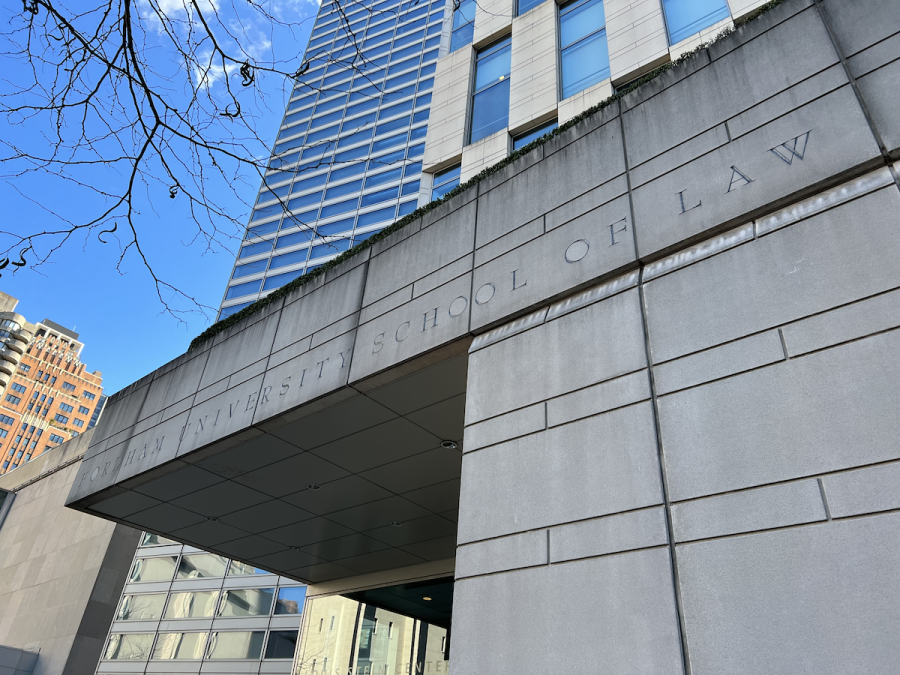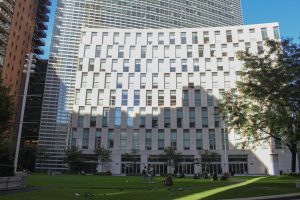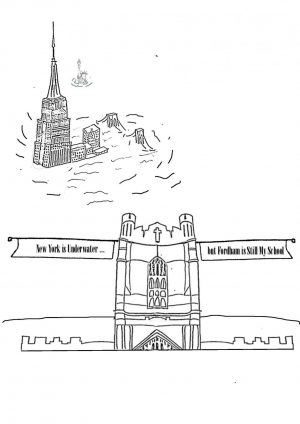Fordham Law Leaves US News Rankings
Dean believes rankings do not provide an accurate reflection of what the law school offers to prospective students
Students and administrators do not believe that a ranking can correctly show the accomplishments, experience and community commitment that the law school demonstrates.
March 1, 2023
Fordham Law School joined a growing list of law schools that have dropped out of the U.S. News and World Report’s “Best Law Schools” rankings on Jan. 13, 2023. Matthew Diller, dean of Fordham Law School, released a letter to the Fordham Law community announcing the decision to withdraw, describing the motivation behind the decision as the media company’s inaccurate reflection of what the university offers.
The report is an annually published list that ranks elementary schools, high schools, colleges, graduate schools, online programs and global universities. In the 2023 report, Fordham Law ranked 37 out of 200 schools in the “Best Law Schools” category, two places lower than the year prior and tied with five other law schools: Wake Forest University; University of California, (UC), Davis; University of Utah; Boston College; and UC Irvine. Both UC Davis and UC Irvine also withdrew from the U.S. News rankings.
In his letter, Diller mentioned that the limitations of the U.S. News ranking algorithm for evaluating the placement of law schools were a factor in the university’s reasoning for withdrawing from the ranking. He added that the rankings do not reflect what a prospective law student may be searching for within Fordham’s law school.
Stephen Brown, assistant dean of enrollment at Fordham Law School, noted that the “momentum around withdrawing” from U.S. News rankings was another reason that the law school made its decision.
“It also does not address whether a law school has programs and faculty expertise in a prospective student’s areas of interest or whether a law school has an alumni network that is supportive of students and provides connections and relationships over the course of a career,” Diller said.
Stephen Brown, assistant dean of enrollment at Fordham Law School, noted that the “momentum around withdrawing” from U.S. News rankings was another reason that the law school made its decision. Beginning in Nov. 2022, several other major law schools withdrew from the rankings, starting with Harvard and Yale, followed by Stanford, Georgetown, Columbi and Berkeley soon after.
Fordham Law students also expressed support for the school’s choice to remove itself from the rankings. Christa Dominy, Fordham College at Rose Hill ’24 and an incoming student at Fordham Law School, said that she supports the school’s decision because she believes that U.S. News paints an incomplete picture of the law school.
“I don’t know if you can define excellence with a few statistics,” she said. “I feel the rankings lack a comprehensive, holistic approach to looking at schools because it misses the essence of what each law school has to offer.”
“Fordham is standing up for their core values of providing a high-quality education to their students and prioritizing their faculty’s hard work. Rankings diminish the work everyone has put in as they reduce you to a number.” Christa Dominy, Fordham College at Rose Hill ’24
Dominy added that rankings can also hinder the experience and work of students and faculty members due to their impersonal nature.
“Fordham is standing up for their core values of providing a high-quality education to their students and prioritizing their faculty’s hard work,” she said. “Rankings diminish the work everyone has put in as they reduce you to a number.”
Pre-law student Lydia Williams, Fordham College at Lincoln Center ’25 and chair of the United Student Government’s diversity, equity and inclusion committee, also expressed her support for Fordham Law’s decision to withdraw from the rankings. She echoed Dominy’s belief that the school is recognizing its value and accomplishments outside of a given number and said she feels the rankings are ineffective.
“I feel the rankings are very numerical and statistical, (as) opposed to being holistic about how a school may value certain aspects of a law school to another,” Williams said.
U.S. News published statements to prospective students and deans of law schools regarding modifications to the “Best Law School Rankings” on Jan. 3. The company announced its decision to use public data required by the American Bar Association as opposed to relying on quality assessments from faculty, students and alumni, as well as placement success. The statement also emphasized that it believes the ranking is still valuable for prospective law students.
“We maintain that data beyond the rankings — whether collected by U.S. News or the American Bar Association — is an essential resource for students navigating the complex admissions process and seeking to evaluate the important but costly education that you deliver,” the statement said.
According to the statement, in addition to the public information published by the American Bar Association, U.S. News utilizes submitted feedback in crafting the rankings to ensure “fair and objective standards for an important academic disciple.”
“In short, we all need to collectively lower the stakes around the U.S. News ranking.” Matthew Diller, dean of Fordham Law School
In his statement, Diller said that whether or not the law school’s achievements are reflected in the U.S. News rankings is a “roll of the dice.” He described the components of the algorithm as “bizarre” and noted that schools can go up or down in the magazine’s ranking “based on imperceptible differences in data points.”
“In short, we all need to collectively lower the stakes around the U.S. News ranking,” Diller said. “If we can achieve this goal, prospective students will make better choices and law schools will better serve the profession.”
Brown said he believes that the rankings are not representative of students’ experience at the university, and he expressed that outside of the law school’s average LSAT scores and GPAs, it is commitment to its communities, academics, sports and experience that allow Fordham Law to be presented in the way it is.
“You really can’t get to know us — and our potential matches with your career goals and desired professional path — through a number based on flawed methodology,” he said.
















garyglitter22#gmail.com • Mar 6, 2023 at 9:24 pm
Reality Fordham Law was stuck in the mud and was going nowhere, this after spending a fortune on the law school building which did not translate to a better perception. Fordham Law is spinning all kinds of masters degree for revenue which the university skims.